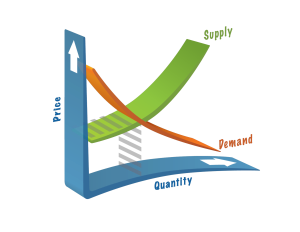There is a clear correlation between the amount of corruption and the level of economic welfare that exists in a country. In countries that are rich, corruption is not as frequent as in countries that are poor. This shows us some fascinating points about human nature – and it also reveals solutions for how to deal with the tendency humans have to become corrupted, dishonest, and fraudulent when placed in positions of public power.
 There are a few things about human nature that are obvious: We all have an inner drive geared towards self-preservation. If we had to choose between us dying, and someone we do not know dying, most of us would have the other person die. And really, there is nothing strange about this. Self-preservation is an innate trait most forms of life on earth – each organism wants to survive and reproduce. Hence, when we are placed in a position of shortage, we will find ways to get out of it – and if it is required – do that at the expense of another.
There are a few things about human nature that are obvious: We all have an inner drive geared towards self-preservation. If we had to choose between us dying, and someone we do not know dying, most of us would have the other person die. And really, there is nothing strange about this. Self-preservation is an innate trait most forms of life on earth – each organism wants to survive and reproduce. Hence, when we are placed in a position of shortage, we will find ways to get out of it – and if it is required – do that at the expense of another.
Then, we have this human characteristic called greed. If we look deeper at the nature of greed, we can see that greed in-fact consists of a deep-seated fear. Greed is the tendency we have to take more than we need, because we fear that we might need that more in the future, and we ‘just’ want to be on the safe side if something unexpected were to happen. Hence, greed is a form of self-preservation, though a more aggressive, and irrational variety – because where greed is involved – there is not an actual need to preserve self.
Moreover, we have a thing called competition. Most people drive themselves through life in a state of competition. They want to compete against neighbors, friends, acquaintances – they want a better car, house, family, etc. Competition thrives in areas/environments where there exists a lack of resources. For example, in an environment where there is little money, the competition for the money will be greater. And when there is a aggressive competition, there will be incentives to cheat, and incentives to preserve self at the cost of another.
We thus have these three ingredients: Self-preservation, greed, and competition – all of which can be said to be ‘natural’ parts of the human experience. And with natural I mean that most people have or develop such traits from an early age – though this does not imply that such traits are impossible to change and direct. No, all of these traits can be directed – and it is possible to change self to not anymore exist within and as self-interest. Though for this blog let us continue with corruption.
We have established that there are certain characteristics in the human nature that is typically part of the human experience. Now, what is clear is that these characteristics represent the foundation, the underlying reasons that will shape and form the decision of an individual to corrupt themselves. And what is fascinating is that these characteristics will become highlighted in a state where there is poverty, and lack of resources to go around. In such a scenario the average human being will start to think only about themselves, and how to make decisions that will benefit their life, and how they can get out of the precarious situation they find themselves in.
We can read the following in an article from Forbes magazine:
“The links between corruption and poverty affect both individuals and businesses, and they run in both directions: poverty invites corruption, while corruption deepens poverty. Corruption both causes and thrives upon weaknesses in key economic, political and social institutions. It is a form of self-serving influence akin to a heavily regressive tax, benefiting the haves at the expense of the have-nots. Trust–essential to financial markets and effective governments everywhere–is difficult to build in poor and corrupt societies.
Poor people and economically strapped businesses have few economic alternatives, and where serious corruption is the norm, they are even more vulnerable to exploitation. In that sense, there is no such thing as “petty” corruption: police shakedowns in a public market, or roadblocks in the countryside where farmers must pay up in order to transport produce to the city, may yield seemingly trivial sums of money, but they help keep poor people poor.
Low-level officials themselves may have trouble earning an honest living. In poor societies, they are often underpaid, when they are paid at all, and must provide a stream of payments to patrons at higher levels. In such settings, bribery, extortion and theft become matters of survival.” (Johnston 2009)
When survival becomes difficult, corruption flourish, hence corruption is a symptom not the actual illness. The real illness is poverty, and poverty is a structural effect of our current debt based money system – also called – capitalism.
”To reduce corruption from its current high levels requires something more than, and different from, additional laws, commissions, invocations of morality, regulations and so on. It requires basic, structural economic change. Earlier reforms achieved so little success because they ignored the very idea or possibility of such change. They left untouched capitalism’s basic incentive structure and capitalists’ power to use enterprise profits for corrupt purposes. Capitalists have continued to face all the benefits and gains that corrupted officials can yield (plus the risks and costs of failing to corrupt them). Capitalists have likewise continued to amass ever-larger profits and thus the funds with which to corrupt.” (Wolff 2014)
It is easy to blame human nature for being the cause of greed, yet at the same time, when we are able to map out and understand how the human functions, would it not then be easy to create a system where these characteristics are not allowed to fester? Is it not possible, that in a system where money is abundant, where opportunities are ripe, and there are no valid reasons to fear for your own survival, that self-preservation, greed and competition would cease to exist?
Maybe we can even stretch this even further, is it maybe so, that self-preservation, greed and competition are products of this current system, characteristics that are not supposed to be part of the human nature? In any case it is obvious, that if we were to restructure our money system and distribute resources equally, this would have massive positive effects on the human population. It has been shown that equality improves, among other things, physical health, mental health and education, and lessens drug abuse and obesity (Wilkinsson, Pickett & Reich 2011).
Corruption is an illness created by inequality and a unfair distribution of resources. We can change this be implementing a new system of distribution – capitalism is not and have never been the only way to structure and organize human labor, productivity and resource distribution. I suggest that we implement a Living Income Guaranteed – a Guaranteed monthly income that is sufficient to sustain a human being so that they can tend to their basic needs.
According to article 3 of the Universal Declaration of Human Rights, all humans have the right to life, though it is obvious that this right cannot be realized unless we implement a system that gives all the money they require creating their lives. Hence, money is a human right and not something that should be subject to conditions and demands.
Investigate the Living Income Guaranteed.
____________________
Michael Johnston (2009). Poverty and Corruption. Forbes Magazine. http://www.forbes.com/2009/01/22/corruption-poverty-development-biz-corruption09-cx_mj_0122johnston.html [2015-10-14]
Richard D. Wolff (2014). Political Corruption and Capitalism. Truthout. http://www.truth-out.org/opinion/item/21559-political-corruption-and-capitalis [2015-10-15]
Richard Wilkinsson, Kate Pickett, Robert B. Reich (2011). The Spirit Level: Why Greater Equality Makes Societies Stronger. Bloomsbury publishing








